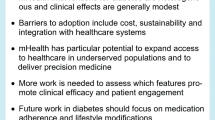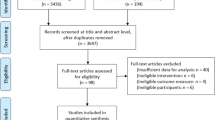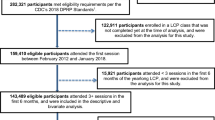Abstract
Aim
To determine the multifactorial influences that modulate adherence to diabetes management.
Subject and methods
We enrolled 9392 middle-aged adults with diabetes from the nationwide cross-sectional 2019 Korea Community Health Survey by the Korea Disease Control and Prevention Agency and stratified the cohort by four diabetes management types: none; therapeutic lifestyle-change only; medical therapy only; and therapeutic lifestyle change–medical therapy. Biological, psychological, contextual, and interpersonal predictors were used to characterize each pattern of diabetes management in the multivariable logistic regression model.
Results
The diabetes management type was associated with biological, psychological, contextual, and interpersonal predictors. Medical therapy was positively associated with sex, age, and diabetes duration and negatively associated with unfavorable psychological and interpersonal factors. Therapeutic lifestyle change among participants who were receiving medical therapy was associated with the patient’s age and diabetes duration, with similar associations as for receiving medical therapy, including the positive association with psychological factors, social participation, and contextual factors. It was higher in those who were living in an urban area, had higher education level, and were unemployed.
Conclusions
Diabetes management constitutes a multifactorial behavioral outcome, rather than being attributable to any single factor, and each type of diabetes management was characterized by the contributions of different factors. The results suggest the need for a multidimensional approach to enhance diabetes management practice for individuals in different disease-progression stages and to improve the extent of adherence to diabetes management.
Similar content being viewed by others
Data availability
This study used data from the 2019 Korea Community Health Survey (KCHS) – a nationwide cross-sectional survey that has been conducted annually by the Korea Disease Control and Prevention Agency (KDCA) since 2008. Data used in this study are available upon request at https://chs.kdca.go.kr/chs/main.do accessed on July 4th 2020.
References
Afaya RA, Bam V, Azongo TB, Afaya A, Kusi-Amponsah A, Ajusiyine JM, Abdul Hamid T (2020) Medication adherence and self-care behaviours among patients with type 2 diabetes mellitus in Ghana. PLoS ONE 15:e0237710. https://doi.org/10.1371/journal.pone.0237710
Alexandre K, Campbell J, Bugnon M, Henry C, Schaub C, Serex M, Elmers J, Desrichard O, Peytremann-Bridevaux I (2021) Factors influencing diabetes self-management in adults: an umbrella review of systematic reviews. JBI Evid Synth 19:1003–1118. https://doi.org/10.11124/JBIES-20-00020
Altevers J, Lukaschek K, Baumert J, Kruse J, Meisinger C, Emeny RT, Ladwig KH (2016) Poor structural social support is associated with an increased risk of type 2 diabetes mellitus: findings from the MONICA/KORA Augsburg cohort study. Diabet Med 33:47–54. https://doi.org/10.1111/dme.12951
Aronson BD, Sittner KJ, Walls ML (2020) The mediating role of diabetes distress and depressive symptoms in type 2 diabetes medication adherence gender differences. Health Educ Behav 47:474–482. https://doi.org/10.1177/1090198119885416
Aung WP, Htet AS, Bjertness E, Stigum H, Chongsuvivatwong V, Kjøllesdal MKR (2018) Urban-rural differences in the prevalence of diabetes mellitus among 25–74 year-old adults of the Yangon Region, Myanmar: two cross-sectional studies. BMJ Open 8:e020406. https://doi.org/10.1136/bmjopen-2017-020406
Bae JH, Han KD, Ko SH, Yang YS, Choi JH, Choi KM, Kwon HS, Won KC (2022) Diabetes Fact Sheet in Korea 2021. Diabetes Metab J 46:417–426. https://doi.org/10.4093/dmj.2022.0106
Bąk-Sosnowska M, Gruszczyńska M, Wyszomirska J, Daniel-Sielańczyk A (2022) The influence of selected psychological factors on medication adherence in patients with chronic diseases. Healthcare (basel) 10:426. https://doi.org/10.3390/healthcare10030426
Blaum C, Cigolle CT, Boyd C, Wolff JL, Tian Z, Langa KM, Weir DR (2010) Clinical complexity in middle-aged and older adults with diabetes: the Health and Retirement Study. Med Care 48:327–334. https://doi.org/10.1097/mlr.0b013e3181ca4035
Brinkhues S, Dukers-Muijrers NHTM, Hoebe CJPA, van der Kallen CJH, Koster A, Henry RMA, Stehouwer CDA, Savelkoul PHM, Schaper NC, Schram MT (2018) Social network characteristics are associated with type 2 diabetes complications: the Maastricht Study. Diabetes Care 41:1654–1662. https://doi.org/10.2337/dc17-2144
Chae M, Han K (2021) Differences in health behavior profiles of adolescents in urban and rural areas in a Korean city. Healthcare (basel) 9:282. https://doi.org/10.3390/healthcare9030282
Chen X, Zou Y, Gao H (2021) Role of neighborhood social support in stress coping and psychological wellbeing during the COVID-19 pandemic: Evidence from Hubei. China Health Place 69:102532. https://doi.org/10.1016/j.healthplace.2021.102532
Chong S, Ding D, Byun R, Comino E, Bauman A, Jalaludin B (2017) Lifestyle changes after a diagnosis of type 2 diabetes. Diabetes Spectr 30:43–50. https://doi.org/10.2337/ds15-0044
Dalal J, Williams JS, Walker RJ, Campbell JA, Davis KS, Egede LE (2020) Association between dissatisfaction with care and diabetes self-care behaviors, glycemic management, and quality of life of adults with type 2 diabetes mellitus. Diabetes Educ 46:370–377. https://doi.org/10.1177/0145721720922953
Darwish L, Beroncal E, Sison MV, Swardfager W (2018) Depression in people with type 2 diabetes: current perspectives. Diabetes Metab Syndr Obes 11:333–343. https://doi.org/10.2147/DMSO.S106797
Feng Z, Cramm JM, Nieboer AP (2020) Social participation is an important health behaviour for health and quality of life among chronically ill older Chinese people. BMC Geriatr 20:299. https://doi.org/10.1186/s12877-020-01713-6
Galaviz KI, Narayan KMV, Lobelo F, Weber MB (2018) Lifestyle and the prevention of type 2 diabetes: a status report. Am J Lifestyle Med 12:4–20. https://doi.org/10.1177/1559827615619159
Ghamri RA, Jabali MA (2020) Effect of depression on diabetes self-care in type 2 diabetes patients at a Saudi teaching hospital: a cross-sectional study. J Microsc Ultrastruct 8:115–120. https://doi.org/10.4103/JMAU.JMAU_68_19
Gilbert-Ouimet M, Ma H, Glazier R, Brisson C, Mustard C, Smith PM (2018) Adverse effect of long work hours on incident diabetes in 7065 Ontario workers followed for 12 years. BMJ Open Diabetes Res Care 6:e000496. https://doi.org/10.1136/bmjdrc-2017-000496
Hempler NF, Joensen LE, Willaing I (2016) Relationship between social network, social support and health behaviour in people with type 1 and type 2 diabetes: cross-sectional studies. BMC Public Health 16:198. https://doi.org/10.1186/s12889-016-2819-1
Horii T, Momo K, Yasu T, Kabeya Y, Atsuda K (2019) Determination of factors affecting medication adherence in type 2 diabetes mellitus patients using a nationwide claim-based database in Japan. PLoS ONE 14:e0223431. https://doi.org/10.1371/journal.pone.0223431
Imbroll CF, Cassar M (2021) Living with diabetes in the workplace. J Diabetes Nurs 25(3):190. https://diabetesonthenet.com/journal-diabetes-nursing/living-diabetes-workplace/
International Diabetes Federation. IDF Diabetes Atlas 2021. https://diabetesatlas.org/atlas/tenth-edition/ Accessed 05 05 2023.
Karthik RC, Radhakrishnan A, Vikram A, Arumugam B, Jagadeesh S (2020) Self-care practices among type II diabetics in rural area of Kancheepuram district, Tamil Nadu. J Family Med Prim Care 9:2912–2918. https://doi.org/10.4103/jfmpc.jfmpc_356_20
Katsaridis S, Grammatikopoulou MG, Gkiouras K, Tzimos C, Papageorgiou ST, Markaki AG, Exiara T, Goulis DG, Papamitsou T (2020) Low reported adherence to the 2019 american diabetes association nutrition recommendations among patients with type 2 diabetes mellitus, indicating the need for improved nutrition education and diet care. Nutrients 12:3516. https://doi.org/10.3390/nu12113516
Khorrami Z, Yarahmadi S, Etemad K, Khodakarim S, Kameli ME, Hazaveh ARM (2017) Urban-rural differences in the prevalence of self-reported diabetes and its risk factors: the WHO STEPS Iranian Noncommunicable Disease Risk Factor Surveillance in 2011. Iran J Med Sci 42:481–487. https://doi.org/10.1177/1010539510387822
Kim DH, Yoo S (2019) How does the built environment in compact metropolitan cities affect health? A systematic review of Korean studies. Int J Environ Res Public Health 16:2921. https://doi.org/10.3390/ijerph16162921
Kirkman MS, Rowan-Martin MT, Levin R, Fonseca VA, Schmittdiel JA, Herman WH, Aubert RE (2015) Determinants of adherence to diabetes medications: findings from a large pharmacy claims database. Diabetes Care 38:604–609. https://doi.org/10.2337/dc14-2098
Koetsenruijter J, van Eikelenboom N, van Lieshout J, Vassilev I, Lionis C, Todorova E, Portillo MC, Foss C, Serrano Gil M, Roukova P, Angelaki A, Mujika A, Knutsen IR, Rogers A, Wensing M (2016) Social support and self-management capabilities in diabetes patients: an international observational study. Patient Educ Couns 99:638–643. https://doi.org/10.1016/j.pec.2015.10.029
Korea Disease Control and Prevention Agency. Community Health Survey. Available from: https://chs.kdca.go.kr/chs/bsnsIntrcn/bsnsSumryMain.do#bsns03. Accessed 02 03 2023
Korea Statistical Information Service. Prevalence of diabetes in adult population aged 19 years and over in 2021 . Available from: https://kosis.kr/statHtml/statHtml.do?orgId=177&tblId=DT_11702_N102&vw_cd=MT_ETITLE&list_id=117_11702_B01&scrId=&language=en&seqNo=&lang_mode=en&obj_var_id=&itm_id=&conn_path=MT_ETITLE&path=%252Feng%252FstatisticsList%252FstatisticsListIndex.do. Accessed 05 05 2023
Kroenke K, Spitzer RL, Williams JB (2001) The PHQ-9: validity of a brief depression severity measure. J Gen Intern Med 16:606–613. https://doi.org/10.1046/j.1525-1497.2001.016009606.x
LeRoith D, Biessels GJ, Braithwaite SS, Casanueva FF, Draznin B, Halter JB, Hirsch IB, McDonnell ME, Molitch ME, Murad MH, Sinclair AJ (2019) Treatment of diabetes in older adults: An Endocrine Society* Clinical Practice Guideline. J Clin Endocrinol Metab 104:1520–1574. https://doi.org/10.1210/jc.2019-00198
Li Y, Kabayama M, Tseng W, Kamide K (2022) The presence of neighbours in informal supportive interactions is important for mental health in later life. Arch Gerontol Geriatr 100:104627. https://doi.org/10.1016/j.archger.2022.104627
Loerbroks A, Nguyen XQ, Vu-Eickmann P, Krichbaum M, Kulzer B, Icks A, Angerer P (2018) Psychosocial working conditions and diabetes self-management at work: a qualitative study. Diabetes Res Clin Pract 140:129–138. https://doi.org/10.1016/j.diabres.2018.03.023
Lunghi C, Moisan J, Grégoire JP, Guénette L (2017) The association between depression and medication nonpersistence in new users of antidiabetic drugs. Value Health 20:728–735. https://doi.org/10.1016/j.jval.2016.09.2399
Mannan A, Hasan MM, Akter F, Rana MM, Chowdhury NA, Rawal LB, Biswas T (2021) Factors associated with low adherence to medication among patients with type 2 diabetes at different healthcare facilities in southern Bangladesh. Glob Health Action 14:1872895. https://doi.org/10.1080/16549716.2021.1872895
Marinho FS, Moram CBM, Rodrigues PC, Leite NC, Salles GF, Cardoso CRL (2018) Treatment adherence and its associated factors in patients with type 2 diabetes: results from the Rio de Janeiro Type 2 Diabetes Cohort Study. J Diabetes Res 2018:8970196. https://doi.org/10.1155/2018/8970196
Matthews KA, Croft JB, Liu Y, Lu H, Kanny D, Wheaton AG, Cunningham TJ, Khan LK, Caraballo RS, Holt JB, Eke PI, Giles WH (2017) Health-related behaviors by urban-rural county classification - United States, 2013. MMWR Surveill Summ 66:1–8. https://doi.org/10.15585/mmwr.ss6605a1
Mendes R, Martins S, Fernandes L (2019) Adherence to medication, physical activity and diet in older adults with diabetes: its association with cognition, anxiety and depression. J Clin Med Res 11:583–592. https://doi.org/10.14740/jocmr3894
Mirahmadizadeh A, Khorshidsavar H, Seif M, Sharifi MH (2020) Adherence to medication, diet and physical activity and the associated factors amongst patients with type 2 diabetes. Diabetes Ther 11:479–494. https://doi.org/10.1007/s13300-019-00750-8
Mohammed AS, Adem F, Tadiwos Y, Woldekidan NA, Degu A (2020) Level of adherence to the dietary recommendation and glycemic control among patients with type 2 diabetes mellitus in Eastern Ethiopia: a cross-sectional study. Diabetes Metab Syndr Obes 13:2605–2612. https://doi.org/10.2147/DMSO.S256738
Molina RT, Ríos García AL, Vergara TA, Florez-Garcia VA, Gutierrez VR, Lozano KF, Barengo NC (2022) Predictors of diabetes risk in urban and rural areas in Colombia. Heliyon 8:e08653. https://doi.org/10.1016/j.heliyon.2021.e08653
Mostafavi F, Alavijeh FZ, Salahshouri A, Mahaki B (2021) The psychosocial barriers to medication adherence of patients with type 2 diabetes: a qualitative study. Biopsychosoc Med 15:1. https://doi.org/10.1186/s13030-020-00202-x
Mroueh L, Ayoub D, El-Hajj M, Awada S, Rachidi S, Zein S, Al-Hajje A (2018) Evaluation of medication adherence among Lebanese diabetic patients. Pharm Pract (Granada) 16:1291. https://doi.org/10.18549/PharmPract.2018.04.1291
Mukherjee PS, Ghosh S, Mukhopadhyay P, Das K, Das DK, Sarkar P et al (2020) A diabetes perception study among rural and urban individuals of West Bengal, India: are we ready for the pandemic? Int J Diabetes Dev Count 40:612–618. https://doi.org/10.1007/s13410-020-00821-8
Nanayakkara N, Ranasinha S, Gadowski A, Heritier S, Flack JR, Wischer N, Wong J, Zoungas S (2018) Age, age at diagnosis and diabetes duration are all associated with vascular complications in type 2 diabetes. J Diabetes Complic 32:279–290. https://doi.org/10.1016/j.jdiacomp.2017.11.009
Noh JW, Chang Y, Park M, Kwon YD, Ryu S (2019) Self-rated health and the risk of incident type 2 diabetes mellitus: a cohort study. Sci Rep 9:3697. https://doi.org/10.1038/s41598-019-40090-y
Park Y-H, Lim K-C, Cho BL, Ko H, Yi YM, Noh E-Y et al (2019) Experiences of healthcare and daily life support services in community-dwelling elders living alone: a thematic analysis using focus group interviewing. J Korean Gerontol Nurs 21:200–210. https://doi.org/10.17079/jkgn.2019.21.3.200
Pedron S, Emmert-Fees K, Laxy M, Schwettmann L (2019) The impact of diabetes on labour market participation: a systematic review of results and methods. BMC Public Health 19:25. https://doi.org/10.1186/s12889-018-6324-6
Pourkazemi A, Ghanbari A, Khojamli M, Balo H, Hemmati H, Jafaryparvar Z, Motamed B (2020) Diabetic foot care: knowledge and practice. BMC Endocr Disord 20:40. https://doi.org/10.1186/s12902-020-0512-y
Reyes J, Tripp-Reimer T, Parker E, Muller B, Laroche H (2017) Factors influencing diabetes self-management among medically underserved patients with type II diabetes. Glob Qual Nurs Res 4:2333393617713097. https://doi.org/10.1177/2333393617713097
Ruston A, Smith A, Fernando B (2013) Diabetes in the workplace - diabetic’s perceptions and experiences of managing their disease at work: a qualitative study. BMC Public Health 13:386. https://doi.org/10.1186/1471-2458-13-386
Schram MT, Assendelft WJJ, van Tilburg TG, Dukers-Muijrers NHTM (2021) Social networks and type 2 diabetes: a narrative review. Diabetologia 64:1905–1916. https://doi.org/10.1007/s00125-021-05496-2
Shibayama T, Noguchi H, Takahashi H, Tamiya N (2018) Relationship between social engagement and diabetes incidence in a middle-aged population: results from a longitudinal nationwide survey in Japan. J Diabetes Investig 9:1060–1066. https://doi.org/10.1111/jdi.12820
Statistics Korea (2022) Causes of death statistics in 2021. https://kostat.go.kr/board.es?mid=a20108100000&bid=11773&act=view&list_no=421206. Accessed 05 05 2023
Sui H, Sun N, Zhan L, Lu X, Chen T, Mao X (2016) Association between work-related stress and risk for type 2 diabetes: a systematic review and meta-analysis of prospective cohort studies. PLoS ONE 11:e0159978. https://doi.org/10.1371/journal.pone.0159978
Tuncay FÖ, Avcı D (2020) Association between self-care management and life satisfaction in patients with diabetes mellitus. Eur J Integ Med 35:101099. https://doi.org/10.1016/j.eujim.2020.101099
Wang Y, Zhang S, Li F, Zhou Y, Zhang Y, Wang Z, Zhang R, Zhu J, Ren Y, Tan Y, Qin C, Li Y, Li X, Chen Y, Zhu F (2020) Therapeutic target database 2020: enriched resource for facilitating research and early development of targeted therapeutics. Nucleic Acids Res 48:D1031–D1041. https://doi.org/10.1093/nar/gkz981
Wibowo MINA, Yasin NM, Kristina SA, Prabandari YS (2022) Exploring of determinants factors of anti-diabetic medication adherence in several regions of Asia - a systematic review. Patient Prefer Adherence 16:197–215. https://doi.org/10.2147/PPA.S347079
Wium-Andersen IK, Osler M, Jørgensen MB, Rungby J, Wium-Andersen MK (2022) Diabetes, antidiabetic medications and risk of depression - a population-based cohort and nested case-control study. Psychoneuroendocrinology 140:105715. https://doi.org/10.1016/j.psyneuen.2022.105715
Yao J, Wang H, Yan J, Shao D, Sun Q, Yin X (2021) Understanding the profiles of blood glucose monitoring among patients with type 2 diabetes mellitus: a cross-sectional study in Shandong, China. Patient Prefer Adherence 15:399–409. https://doi.org/10.2147/PPA.S292086
Yokobayashi K, Kawachi I, Kondo K, Kondo N, Nagamine Y, Tani Y, Shirai K, Tazuma S (2017) Association between social relationship and glycemic control among older Japanese: JAGES Cross-Sectional Study. PLoS ONE 12:e0169904. https://doi.org/10.1371/journal.pone.0169904
Zhang ZP, Premikha M, Luo M, Venkataraman K (2021) Diabetes distress and peripheral neuropathy are associated with medication non-adherence in individuals with type 2 diabetes in primary care. Acta Diabetol 58:309–317. https://doi.org/10.1007/s00592-020-01609-2
Acknowledgements
This work was supported by the National Research Foundation of Korea grant funded by the South Korean government (NRF-2022R1F1A1068236).
Funding
This work was supported by the National Research Foundation of Korea grant funded by the South Korean government (NRF-2022R1F1A1068236).
Author information
Authors and Affiliations
Contributions
Conceptualization, H.K. and H.S.; methodology, H.K. and H.S.; software, H.K.; validation, H.K. and H.S.; formal analysis, H.K. and H.S.; investigation, H.K. and H.S.; writing—original draft preparation, H.K. and H.S.; wiring—review and editing, H.K. and H.S.; supervision, H.S.; project administration, H.S.; funding acquisition, H.S. All authors have read and agreed to the published version of the manuscript.
Corresponding author
Ethics declarations
Ethics approval
The approval of the research ethics review is not necessary for the Korea Community Health Survey, which was established by the Ministry of Health and Welfare in accordance with the Article 2 of the Enforcement Decree of the Bioethics and Safety Act.
Informed consent
As this study was a secondary data analysis of a national survey, the raw data file was publicly available. Any personal information was de-identified and provided to the public.
Consent for publication
Not Applicable.
Conflicts of interest
The authors declare that the research was conducted in the absence of any commercial or financial relationships that could be construed as a potential conflict of interest.
Additional information
Publisher’s Note
Springer Nature remains neutral with regard to jurisdictional claims in published maps and institutional affiliations.
Rights and permissions
Springer Nature or its licensor (e.g. a society or other partner) holds exclusive rights to this article under a publishing agreement with the author(s) or other rightsholder(s); author self-archiving of the accepted manuscript version of this article is solely governed by the terms of such publishing agreement and applicable law.
About this article
Cite this article
Kim, H., Son, H. Multidimensional behavioral factors for diabetes management among middle-aged adults: a population-based study. J Public Health (Berl.) (2024). https://doi.org/10.1007/s10389-023-02185-9
Received:
Accepted:
Published:
DOI: https://doi.org/10.1007/s10389-023-02185-9




